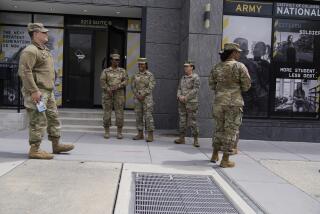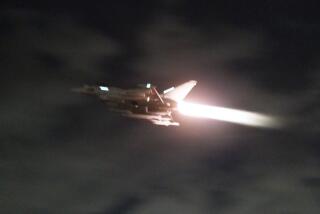Pentagon Predicts No Protracted Land War : Military: The top generals base their forecasts on the allied successes in air operations.
With Iraq’s extensive army and air force surprisingly inactive so far, the Pentagon predicted Monday that the allied effort will not require a ground war that “takes months or years.”
In the first five days of the war, the United States and its allies have been virtually unimpeded in their air strikes. Iraqi command and control is clearly disrupted, although the degree of damage is unclear, military briefers said in Washington and Saudi Arabia.
Allied warplanes attacked targets in Iraq and Kuwait on Monday despite a cloud cover that has hampered those operations and frustrated efforts to assess the damage caused by the intensive bombing campaign.
Maj. Gen. Burton R. Moore, the director of operations for the U.S. Central Command, said in Riyadh that more than 8,100 sorties had been flown since last Wednesday. He said two more Iraqi aircraft were shot down Monday, bringing the total to 17. Another American plane, a Navy F-14 Tomcat, was shot down, raising the total number of U.S. planes lost to hostile fire to nine.
“We are achieving success with the air campaign,” Lt. Gen. Thomas W. Kelly, director of operations for the Joint Chiefs of Staff, told reporters at the Pentagon.
“I feel quite sure that a protracted ground war . . . one that takes months or years, can be avoided,” he said.
Defense Secretary Dick Cheney, appearing on morning interview programs on four American television networks, said it is impossible to make a precise prediction of the length of the conflict. But he said he expects the war to end this year.
“It could, conceivably, be weeks; it could, conceivably, be months,” Cheney said on CNN. “I don’t expect any longer than that.”
So far, the biggest surprise of the war has been Iraq’s hesitant response, both in the air and on the ground. With the exception of launching 22 militarily insignificant Scud missiles at civilian targets in Israel and Saudi Arabia, the Baghdad regime has done little more than absorb continuing punishment.
Cheney suggested that the Iraqi military--despite the expenditure of $50 billion on armaments over the past decade--has been so disrupted by the allied attack that it is unable to function properly.
“I think it’s less a matter of his holding back than the fact that he really is incapable, because of the success of our efforts, of doing very much,” Cheney said on CBS. “The fact that he hasn’t used his air force more effectively is, I think, a statement of his lack of capability in that area, and the success of our efforts.”
Kelly agreed with Cheney that the Iraqi military establishment may be unable to respond because its command, control and communications system has been disrupted. “You see their air force not responding very well,” Kelly said. “You see their army is still sitting generally in the same places they were when this began. I can’t tell you exactly what the communication is between the leadership and the troops in the field, but the troops in the field aren’t doing very much.”
But, in a more restrained assessment, Rear Adm. John (Mike) McConnell, director of intelligence for the Joint Chiefs of Staff, said the Iraqi “command element is still in control of military activity.”
More precise information is hard to come by because cloudy weather is hampering the aerial reconnaissance needed to assess the impact of the bombing, Pentagon officials said.
“There’s a frustration level all over the (Pentagon) building about what bomb damage assessment is,” Defense Department spokesman Pete Williams said. “This sort of interpretation of this data is an art, not a science. It requires good weather, which we’ve not had a lot of . . . the last few days.”
The bad weather also has hampered the search for mobile Scud missile launchers. Kelly said most of Iraq’s fixed-site launchers have been hit but a number of mobile launchers clearly remain operational.
Of far more military significance, the Pentagon has been unable to fully assess the results of bombing raids--many of them flown by eight-engine B-52s--against Iraq’s elite Republican Guard troops.
“We have been striking the Republican Guard pretty hard,” Kelly said. “And we have been striking their supply installations because we feel if we can cut them off the army can rapidly atrophy.”
The allies now say that 21 servicemen, 12 of them American, are listed as missing in action. Iraq claims to have shot down more than 150 planes, while the total listed by the allies is 16, nine of them American.
More to Read
Sign up for Essential California
The most important California stories and recommendations in your inbox every morning.
You may occasionally receive promotional content from the Los Angeles Times.






